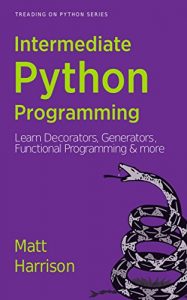Python is easy to learn. You can learn the basics in a day and be
productive with it. But there are more intermediate and advanced Python constructs that you
will eventually run across if you spend enough time with it. These "Pythonic"
constructs, while not necessary per se, allow you to be more succinct,
re-use code, and think about code in a different way.
This book covers many of these intermediate constructs and serves as a reference for:
* Functional Python programming
* List comprehensions
* Generator expressions
* Set & dict comprehensions
* Iteration
* Generators
* Closures
* Decorators
I have taught these constructs at popular tutorials at PyCon and other
conferences. This book is based on my experience teaching and using
Python for many years. I hope you learn something while in the course
of your reading. Maybe it will help you in your next task, code
review, or job interview.
productive with it. But there are more intermediate and advanced Python constructs that you
will eventually run across if you spend enough time with it. These "Pythonic"
constructs, while not necessary per se, allow you to be more succinct,
re-use code, and think about code in a different way.
This book covers many of these intermediate constructs and serves as a reference for:
* Functional Python programming
* List comprehensions
* Generator expressions
* Set & dict comprehensions
* Iteration
* Generators
* Closures
* Decorators
I have taught these constructs at popular tutorials at PyCon and other
conferences. This book is based on my experience teaching and using
Python for many years. I hope you learn something while in the course
of your reading. Maybe it will help you in your next task, code
review, or job interview.






